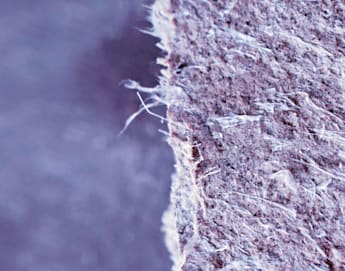Mr Morris worked cutting and laying Marley floor tiles his whole career, from 1953 to the early 1990s on a freelance basis. His only break was two years National Service in the 1950s.
Tragically, in 2013, Mr Morris was diagnosed with mesothelioma and died in 2014. His wife Ann continued the claim on his behalf. In a witness statement before he died, Mr Morris said that the tiles he worked with daily were given to him in boxes covered in white dust and that he was regularly covered in dust through to his vest after cutting the floor tiles by hand and cleaning up the debris at the end of the day.
Marley originally argued it did not owe a duty of care to Mr Morris because he was not employed by the company; that so few of the tiles he worked with contained asbestos he could not have been exposed; and contributory negligence, it being Mr Morris' responsibility to keep himself safe at work. The onus was placed on Mr Morris, in his 70s and seriously ill, to prove that the tiles manufactured by Marley contained asbestos, which the company continued to strenuously deny.
Peter Williams pursued the case on behalf of Mr Morris and paralegal Rebecca Foster managed to uncover vital letters from the 1980s in an archive at the British Library that showed most of the tiles used by Mr Morris contained asbestos. Fieldfisher and barrister Harry Steinberg QC of 12 King's Bench Walk also argued that a gold watch inscribed with recognition of 25 years' service and presented to Mr Morris in 1973 showed he had worked exclusively for Marley and was effectively an employee.
We also used our case of Bussey vs Anglia Heating, where the court rejected the use of TDN13 as a yardstick for safety or the touchstone of liability in asbestos claims, to prove Marley had a duty to protect Mr Morris from low-level exposure to asbestos. We argued that being a long-term and large-scale manufacturer of floor tiles, Marley was fully aware of the risks of very low doses of asbestos exposure from 1965 but failed to protect Mr Morris or warn him of the dangers.
Peter was also able to use a former case, that of Ann Siddons, as witness to the working environment at the Marley factory. Sadly, Ann died from mesothelioma contracted from dust in the factory, which her husband Harry brought home on his clothes.
"Roy's case was hugely complicated, compounded by Marley disclosing only a handful of pages of documents about their tiles and only after a court order," Peter said. "In contrast, we unearthed hundreds of documents in the British Library archive, clearly in the public domain.
"It was very satisfying to finally achieve a deserved settlement for Ann Morris. Tragically, it was too late to provide any comfort for Mr Morris who grafted for his whole working life. People like Mr Morris deserve better treatment than that.
"The only consolation is that following this settlement, other claimants who worked with Marley tiles should find it much easier to claim against the company because of the documents we managed to uncover."
Contact us
For further information about mesothelioma claims, please call Peter Williams on 03304606805 or email peter.williams@fieldfisher.com.
Alternatively
- You can speak to our asbestos disease lawyers on freephone 0800 358 3848
- email us: personalinjury@fieldfisher.com
- Complete the short online enquiry form
All enquiries are completely free of charge and we will investigate all funding options for you including no win, no fee.

